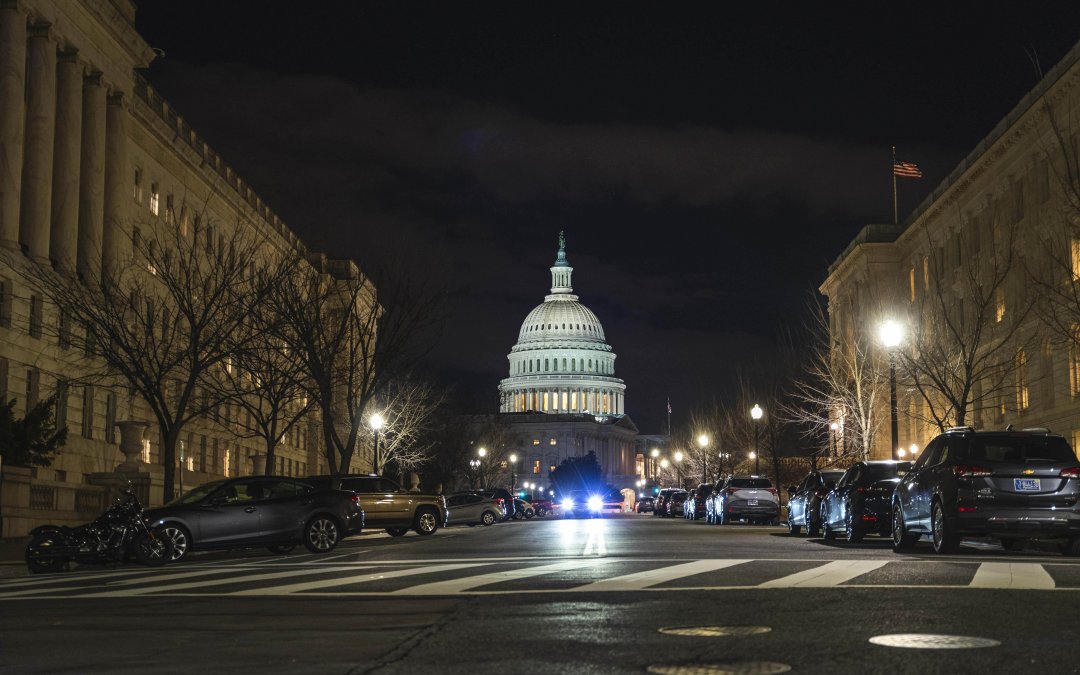WASHINGTON – Speaker of the House Mike Johnson (R-La.) has negotiated a deal with Senate Majority Leader Chuck Schumer (D-N.Y.) that would extend government funding until March.
The stopgap extension would prevent a partial government shutdown from taking place at the end of this week. The text of the measure was released on Sunday night.
The two chambers still have to vote on the plan, known as a continuing resolution, but having the backing of the two top leaders should be able to get the votes needed before about 20 percent of the federal government runs out of money at the end of the night on Friday.
Johnson’s solution mirrors the deal that ultimately led to former Speaker Kevin McCarthy’s ousting last year, overriding the demands of certain far-right conservatives who are staunch in their opposition to bipartisan negotiation.
“I wish the Freedom Caucus could be the determinant of every bill that is drawn,” Rep. Bob Good (R-Va.), chair of the caucus, said outside of the Capitol on Thursday. “I think we would be a lot better off if we could do that.”
Several hard-line Republicans began objecting to any deal even before the House officially returned from break last week. That is when Johnson made his first deal with Schumer on Jan. 7 setting the framework for appropriations. The pair set funding limits of around $1.66 trillion – an amount in line with what President Joe Biden and McCarthy when he was speaker agreed to in last year’s debt ceiling package
While the deal was meant to pave the way toward a future decision on the appropriations bill, certain conservatives were quick to call out their leader for acting in cooperation with Schumer.
“I’m not interested in, you know, just defaulting to whatever Chuck Schumer and the White House say,” Rep. Chip Roy (R-Texas) said as he left the Capitol on Thursday afternoon. “We have the House.”
Roy is one of the most outspoken critics of Johnson’s budget negotiations, arguing that the spending limit is set too high. He is pushing for speaker Johnson to work with fellow far-right Freedom Caucus members to renegotiate the spending cap.
“I just disagree with $1.66 (trillion). There’s no world in which I would land on that,” Roy said Thursday. “I just wouldn’t.”
Good, Roy and their fellow far-right representatives spent the majority of last week making their stance clear: If a budget deal is not reached by Friday, a government shutdown is the preferred option.
“Well, only four of the 12 spending bills will expire on Jan 19th,” said Good. “I’ve said many times over that I certainly don’t fear that happening. We shouldn’t be in a hurry to continue the policies that are destroying and bankrupting the country.”
After the extension was announced on Sunday, Freedom Caucus members were quick to criticize the deal but didn’t say outright if they would vote against it.
“Enough with the continuing resolutions,” Rep. Andy Biggs (R-Ariz.) tweeted Sunday. “Congress keeps punting this while our southern border remains a mess and our national debt continues to surge.”
Still, their ultimatum echoes war cries made last year, when McCarthy negotiated a continuing resolution that ultimately led to his ouster as speaker, initiated by Freedom Caucus members.
Whether they plan to hold Johnson to the same do-or-die standard remains unclear.
“Republicans have turned the House of Representatives into a spectacle and a national embarrassment,” House Minority Leader Hakeem Jeffries (D-N.Y.) said in response to the gridlock on budget negotiations at his weekly press conference on Thursday. “The most unproductive Congress in modern American history is being presided over by these MAGA Republicans.”

